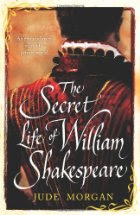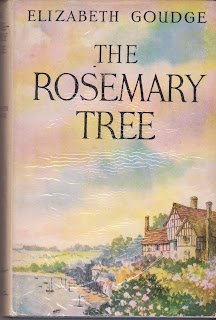The Secret Life of William Shakespeare by Jude Morgan
Jude Morgan, who has acquired many plaudits for his accounts of Byron, Caroline Lamb, the Brontës and others, has daringly turned his hand to Shakespeare, a man whose very existence has been doubted by many. This book tells the story of Shakespeare's adult life, while he was still working in Stratford for his glovemaker father, and beginning with his meeting with Anne Hathaway. Despite his father's disapproval he is drawn to the performances staged by travelling players, conscious that there is something missing in his life, a need which proves to be only temporarily assuaged by his love for Anne. What starts as a minor rebellion becomes an open one and he leaves for London with a troupe of players. Life as an actor, even a competent one, is hard in a city where the theatres are frequently closed by plague, so he turns his hand to improving scripts and, eventually, to his own plays, but his writing is driven as much by the creative urge as by the need for survival.
You really need a spark of genius to put words into William Shakespeare's mouth, he had such facility with words, coining a new one when there was nothing that would immediately answer. Jude Morgan is very, very good, but there was a tiny lack, for me, of that spark of brilliance, and a recognition that all the best lines in the book actually come from Shakespeare's plays, but this is subtly handled and there's never any hint of pastiche. And Morgan uses the neologising nicely, making it the subject of discussion between writers, producing this inspired example:
Look you, if we were to be villains, what manner of villains would we prefer to be? Weak vacillant ones, or tremendous ones, tip-full and exuberating?Clever, that, I thought appreciatively as I read. There are some well-wrought Shakespearean conceits, too, as here:
Her parents were dead, and she lived with an uncle as guardian and the old deaf woman who had been her nurse in St Magnus hard by London Bridge. The uncle had been a tanner and had, reputedly, made a heap of money. So it seemed from the look of the house, when Ben at last made his formal call: bars and shutters everywhere proclaimed the miser's hoard. Within, he passed through so many locked doors, and little passages and vestibules – like infant rooms imprisoned and stunted - that he thought he might come out at the back door, never having been properly in the house at all.That made me think of strongboxes, and Elizabethan architecture, and dark panelling. Indeed, the joy of this book was when the attention was turned to writing - to the creative drive, the pleasure of words, the turning of old stories into new. At such times all the playwrights, Will himself, Marlowe, Jonson, Kyd, Dekker, seemed most alive, close to our modern sensibilities but not anachronistically so – after all, the problems that face the writer are born anew with every individual. Something of that is true for actors, too - you can learn technique, but not talent. Will's also an actor, of course, and Morgan uses this adroitly to address the issue of Shakespeare's identity, drawing one of those characters who's difficult to know, someone who slips through the fingers of even the most perceptive acquaintance.
Morgan's feel for the time is very good. As far as language goes, he chooses to go for modern idiom, while again avoiding either words or images which would be too obviously out of period, and, as I've suggested, keeps his characters functioning within a convincingly Elizabethan worldview. He wields recurring leitmotivs effectively as well, which gives a satisfying overall coherence. Perhaps this book will never quite "harrow up thy soul, freeze thy young blood" but it's an excellent historical novel and offers some convincing insights into Shakespeare and his contemporaries. If Morgan set out, in the words of his protagonist, to "write me a man, who thinks and lies and bleeds, and you remember him when you lay the book down or leave the theatre, recall and judge and think around him like a man you've known long to drink with", then he has succeeded here.



Argh, I SO need this book. Excellent review as usual.
ReplyDeleteI've heard nothing but good about Jude Morgan's books but have yet to read them. You make an excellent case for this one, so I'll add it to the wish list. Thankyou!
ReplyDeleteI was hesitant about reading this because I wondered how Morgan's imagined Shakespeare would turn out, but it sounds as though he has got it fairly right. I loved his last two novels, but the others are a bit hit and miss for me. Shakespeare is a big subject to take on!
ReplyDeleteI have heard lots of good things about Jude Morgan but I haven't read it yet...
ReplyDeleteI have The Taste of Sorrow and have to read it yet. I've been trying to get Passion for ages. I'm going to add this one to my list, just because it's another interesting view of how Shakespeare got started, and the playwrights of the time - plus gorgeous Elizabethan setting, which I love!
ReplyDeleteGood review, Geranium Cat. Were you disappointed by it, or did you think it adds to the Shakespeare canon?
i have started reading the book....i love Shakespeare and i have always found something extraordinary about this great writer. Lets see how Jude has captured the early life of Shakespeare, the book seems interesting so far.....
ReplyDelete